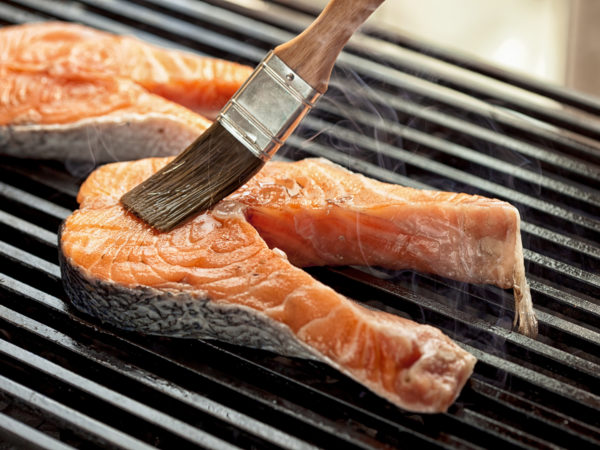Losing Out on Omega-3s?
I understand that omega-3 fatty acids degrade in the presence of light, heat and oxygen. So does cooking salmon alter the healthy qualities of the fish?
Andrew Weil, M.D. | November 26, 2002

Updated on 3/30/2005
You’re quite right. Omega-3s can be destroyed by air, light and heat, which is why the less exposure and processing that fish undergo between being caught and ending up on your plate, the better. According to the National Fisheries Institute, freezing fish and other seafood as well as cooking it by baking, broiling or steaming will cause minimal loss of the health-protective omega-3 fatty acids they contain. The Institute also reports that deep-frying, with its very high temperatures, could destroy some omega-3s; of course, it can also increase the total fat of your meal. I would add that blackening salmon by high-temperature sauteeing could also lower the omega-3 content.
The best way to preserve omega-3s and keep down your total fat intake is to bake, broil, poach, steam or grill salmon just to the point of doneness which you prefer (I like it very moist and tender inside), with no added fat. If you’re not sure how to cook salmon (or other fish), check out some of my recipes in the Healhty Kitchen.
To make sure you’re getting the freshest fish possible, the National Fisheries Institute suggests following these rules:
- Always buy fish last when shopping (ask for ice to keep it cold if you can’t get it into your refrigerator within 15 to 20 minutes).
- Avoid fish with a strong fishy odor – look for those that smell clean.
- Don’t buy any fish past the “sell by” or “use by” date on a supermarket package.
- Choose whole fresh fish with bright, clear and shiny eyes and shiny scales that cling tightly to the skin as well as with bright pink or red gills.
- Make sure fish steaks and fillets are moist, free of dried or browned edges. The flesh should be firm and springy to the touch.
- Never buy cooked fish or seafood that is in direct contact with raw fish in a display case.
- Make sure frozen fish are free of ice crystals and freezer burn and show no sign of thawed juices.
- Make sure packages are clean and tightly sealed.
- Avoid packages placed above the frost line in a store display freezer.
If you can’t get fresh fish (I recommend wild Alaskan salmon), canned salmon and sardines will give you omega-3s. I especially like canned wild sockeye salmon from Alaska. It’s convenient to have on hand when you can’t get good quality fresh salmon. (A good brand is Vital Choice canned salmon available via www.vitalchoice.com.)
Andrew Weil, M.D.









